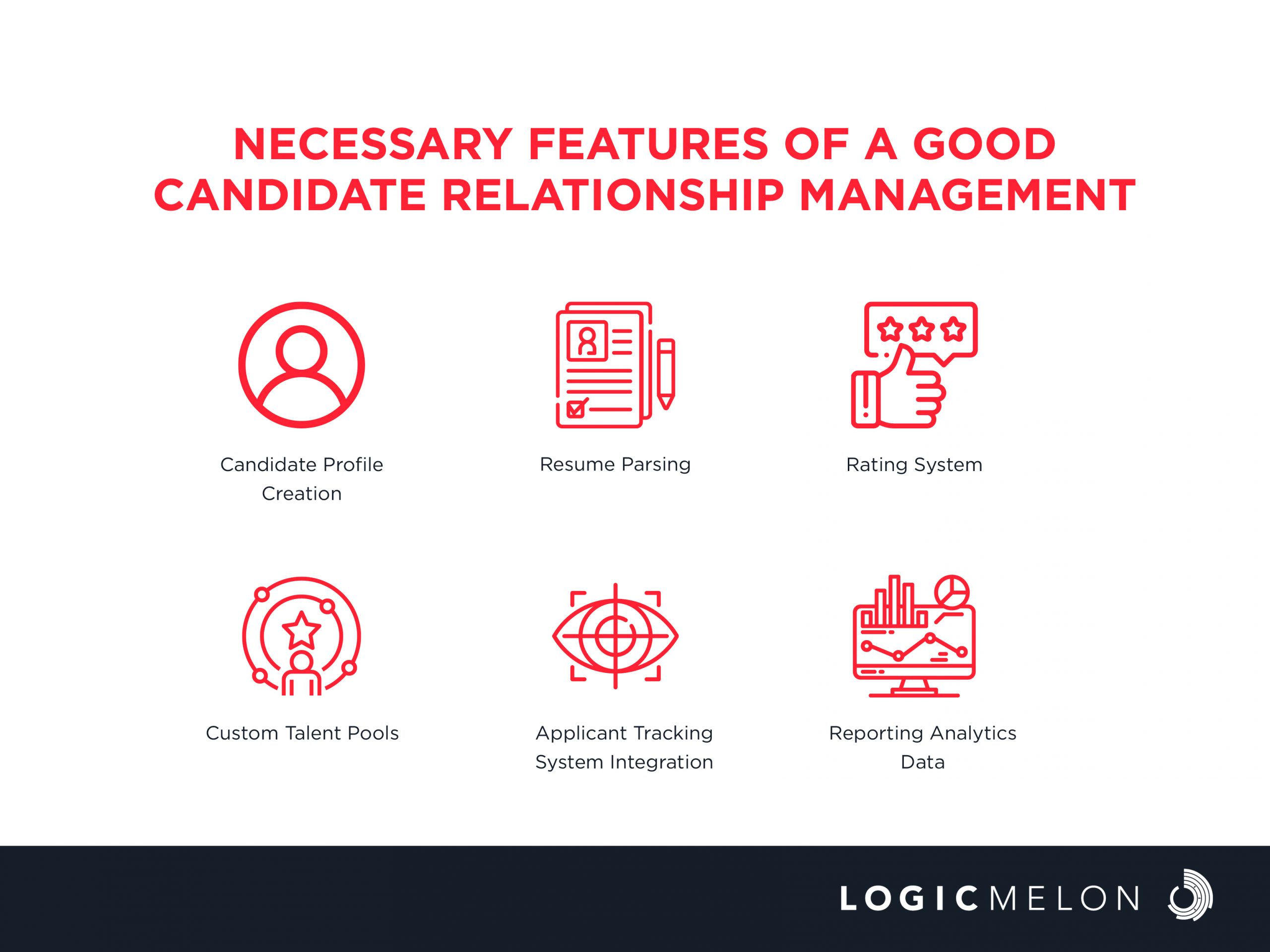What Is Candidate Relationship Management?
To ensure your business runs successfully, you need to source top talent and engage with them ahead of the requirements. To achieve this, you need to have candidate relationship management software.
To gain a competitive edge in your job market, you need to use the right tools for your hiring process in your business.
It does not help if you wait for the candidates and do not work on a proactive recruitment process. You need to keep a ready pool of candidates for your recruitment needs.
Candidate Relationship Management Definition
Candidate relationship management (CRM) is the process of attracting candidates, keeping them engaged, and maintaining healthy relationships with them.
This could extend to past candidates, passive candidates, and current employees. The main reason for this is to build a candidate pool that helps you with any recruitment needs that might come up.
Candidate relationship management software helps to maintain relationships with the candidate. It also helps to reduce the time and cost to hire.
Importance of Candidate Relationship Management
When it comes to building relationships with the candidates, it has a huge impact when they become employees of your company.
A positive candidate experience helps you build loyalty with your employees. But, this begins when the candidate learns about your company, job role, core values, and overall reputation.
All this can factor into the candidates once they become employees of your organisation. The initial candidate engagement helps to build a good employee experience.
The following are some of the advantages of using CRM to build candidate relationships for your business:
Gain an Edge Over the Competitors
It is essential to stay competitive in your business, especially during growth. As mentioned earlier, you need to attract top talent for your workforce to achieve this.
You need to source candidates from your competitors and build a relationship with them to attract passive talent.
If an organisation lays off some high-performing employees, you could easily add them to your workforce if you have built relationships with them.
This can help you scout top talent and hire industry experience employees. They would also require less time to train for their job.
You need to leverage CRM software to build these relationships with the employees and candidates to improve your workforce.
Helps to Build Your Employer Brand
Candidates usually research a lot about the company before applying for a vacant role. It is relatively easy to understand more about a company and its reputation among the employees.
Building an employer brand for your company and standing apart from all your competitors might be a challenge.
When a candidate is interested in building a relationship with your company, you must have a good reputation. Candidate relationship management may not work well without brand recognition for your company.
The potential candidates you build relationships with need to understand your values and culture to have an assurance that you would be the right fit for them.
Using a candidate relationship management system can build relationships with potential candidates and improve employer branding.
Promotes Your Company Culture
When you engage the candidates, they will get a glimpse of the company culture and start to form expectations about work life.
When a candidate is engaged with the company, and the same candidate joins as an employee, they become more engaged with the company and give you their highest performance.
These employees will strive to prove themselves to the organisation. They might even be qualified for upskilling in your organisation.
It all boils down to how much you work towards a positive relationship with the candidates through candidate relationship management.
Helps to Identify Weak Points
Every recruitment process consists of multiple stages, and every stage needs a different approach to keep the candidates engaged.
For instance, in the recruitment funnel model, the candidate engagement stage greatly attracts them and starts their recruitment journey.
The candidate might drop off at any stage in the recruitment process. There might be many reasons for the candidate’s drop-off.
You are responsible for finding out the stages where the candidate drops off your recruitment process.
A CRM software provides insights into the candidates and the communication touchpoints that led to the candidate drop-off.
Using this, you could develop candidate relationship management strategies that consider different ways to reduce the drop-off at specific stages.
Nurtures Top Candidates in Talent Pools
Similar to a candidate drop-off, the hiring manager or the recruiter might reject the candidate depending on the requirements.
This might not mean that you should end communication with them. You can still keep them engaged and bring them in as future job candidates.
Sometimes the candidates might even be suitable for a different role as future candidates. For this, you must pick the top talent from your talent pipeline and nurture them.
Using CRM software can help engage job seekers and find a suitable candidate for your company. The same applies to passive candidates.
Builds a Diverse Candidate Pool
Diversity goes a long way in building your employer brand. Additionally, even the employees benefit from a team of diverse peers with different perspectives on a problem.
When you launch your business on a global scale, you can reap these benefits if your company already employs people from around the globe.
Using candidate relationship management tools, you can check your talent pipelines and compare them with the adverse impact on your organisation.
Then, you can easily ensure that your recruitment efforts go towards finding candidates from diverse backgrounds.
Necessary Features of a Good Candidate Relationship Management
When choosing CRM tools, you need to see if they have the essential features to help you in the recruiting process.
The following are some of the features that every CRM software must have:

Candidate Profile Creation
Every Candidate relationship management tool should come with a feature that enables the user to create profiles for candidates based on the data from the resume, communications, and the recruiter’s inputs.
Suppose you are an external recruitment agency helping your client find candidates. You need to have a feature where you can import and share the candidate’s profile with them.
Resume Parsing
When you have a massive volume of resumes and CVs, it is not feasible for a recruiter to manually look at each resume and shortlist them to pick out active candidates for recruitment.
Every CRM should have a resume parser to sort through the massive volume of resumes and pick them out based on the keywords, designation, experience, or other filter tags.
This will save time for the recruitment and ensure that you select the best talent for your vacant roles.
Rating System
When choosing qualified talent from your talent pool, it is better to include the hiring manager in your selection process.
The same goes when you work for clients and take care of their hiring process. It is better to offer them a choice of suitable candidates.
The better way to offer a list of candidates is by having a scoring system to award ratings based on how relevant they are for the job and how well they can adapt to the workforce.
In a candidate management system, this is necessary to make the screening process much more manageable.
Custom Talent Pools
When you hire regularly, you must have a different talent pipeline for various job roles or departments across your organisation.
The candidate relationship management software must allow you to prepare talent pipelines and handle them based on the various needs of the company and the job requirements.
Applicant Tracking System Integration
An applicant tracking system helps you handle all your applicants for your recruitment.
Regarding recruitment, a candidate relationship management tool and an applicant tracking system work together to provide you with better aid in the recruitment process.
Every CRM should offer ways to easily integrate your applicant tracking system to help you and provide you with a better candidate experience.
Reporting Analytics Data
Every recruitment effort needs constant improvement to attract top talent. You need a complete analysis of your existing recruitment efforts.
Various recruitment metrics provide valuable insight into the time it takes to hire and the cost.
Also, information about your candidate database and how many of them you managed to bring into your workforce will help you focus your recruitment efforts in the right direction.
Best Practices for Candidate Relationship Management
Building and maintaining professional relationships is a challenge. It is even more so when you do this with multiple candidates. The following are some best practices to help you build a relationship with the candidate using a CRM.
- When pitching the job to the candidate, recruiters usually overpromise on their role and responsibilities. This builds enormous expectations from the candidate. When the company fails to deliver on the expectations, it results in the candidate’s disappointment.
- Always manage the expectations of the candidates and deliver on your promises. Do not exaggerate about the company. A good brand image for your company can help you bring in new candidates.
- On the job descriptions, try to define a specific timeline on when the candidate can expect a callback, and ensure that you abide by the timeline and contact the candidate appropriately.
- Candidate relationship management requires the help of every stakeholder in the company. From defining the ideal candidate to screening them and bringing them into the workforce, you need the help of every member in the recruitment process. Collaborate with every stakeholder to avoid making a wrong decision.
- When engaging with passive candidates, you need to understand more about the candidate and then reach out to them with customised messages. A personal touch can hire passive candidates and keep them interested in the job.
Frequently Asked Questions
1. What is candidate relationship management?
Candidate relationship management (CRM) is the process of attracting candidates, keeping them engaged, and maintaining healthy relationships with them.
2. What are the Advantages of using a CRM System?
The following are the advantage of using a CRM system for your hiring efforts:
- Gain an Edge Over the Competitors.
- Helps to Build Your Employer Brand
- Promotes Your Company Culture
- Helps to Identify Weak Points
- Nurtures Top Candidates in Talent Pools
- Builds a Diverse Candidate Pool
3. What are the Necessary Features of CRM Software?
The following are some of the necessary features for CRM software:
- Candidate Profile Creation
- Resume Parsing
- Rating System
- Custom Talent Pools
- Applicant Tracking System Integration
- Reporting Analytics Data
Conclusion
Candidate relationship management can help you identify the talent pool for your job openings and bring them into your workforce. This proactive hiring method is necessary to find the best employees for your company. They help you stay competitive and build a brand image for you. Leveraging a CRM tool and an applicant tracking system can help you achieve that.
LogicMelon
Award-winning recruitment software that will find, attract, hire and analyse the way you want to work. At LogicMelon, we have experienced software recruitment marketing specialists to help you build effective recruitment solutions supported by the best customer service you’ll find anywhere!
Email: sales@logicmelon.com or call LogicMelon (UK) +44 (0) 203 553 3667 (USA) +1 860 269 3089
The Impact of Employer Branding in the Recruitment Process
Employer branding improves the hiring process, builds trust and retains talent in the organisation and markets itself to desired job seekers.
What Is Absence Management, and Why Do You Need It?
An absence management plan helps you meet employee needs while monitoring unauthorised absences and sick leave abuse.
How to Build a Hybrid Work Culture
Hybrid work can accommodate a range of diverse work schedules and plan their workweek to comply with corporate standards and personal needs.


